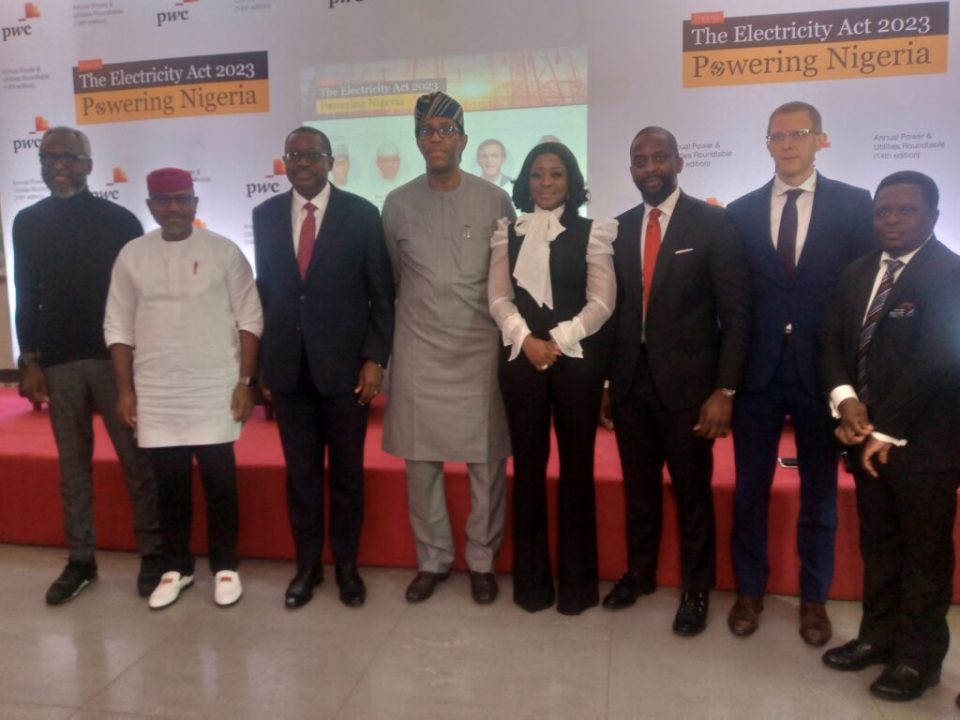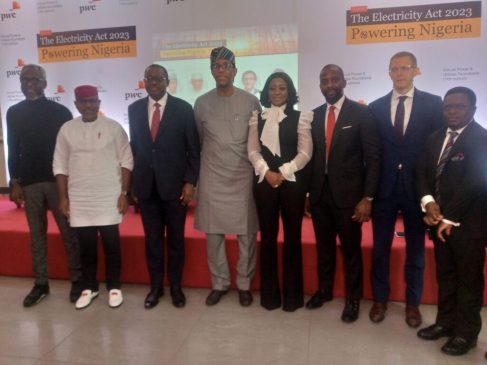NERC commissioner wants regulatory economics introduced in universities
By Yusuf Yunus
Energy stakehders at the 14th PwC Annual Power and Utilities Roundtable Conference with the theme: The Electricity Act 2023, Powering Nigeria in Lagos.
Mr Dafe Akpeneye, Commissioner, Legal Licensing and Compliance at the Nigerian Electricity Regulatory Commission (NERC), on Thursday advocated the introduction of ‘Regulatory Economics’ as a course in Nigerian universities.
Akpeneye said that this would help to build local capacity in the power sector.
He made this call during the 14th PwC Annual Power and Utilities Roundtable Conference with the theme: ‘The Electricity Act 2023, Powering Nigeria in Lagos’.
The commissioner said that the laws in Nigeria today that could handle a power sector transaction, end-to-end, with skill and capacity building were very few.
“So, we need to build local capacity along the lines of everything we do in the sector.
“No university in Nigeria teaches regulatory economics. What we do in the sector is regulatory economics. So, we need to start building our local capacity towards doing these things locally,” he said.
Akpeneye also noted that Nigeria had no dedicated funding institution mainly for the development of the power sector.
He cited India as a case study of a dedicated power bank established and responsible for funding and issues regarding the power sector in that country.
“So, our sector, being a critical sector to the country needs to have a dedicated institution to funding the needs of the sector, both short and long terms goals.
“We also need to create an environment where investment can come in and mature,” the commissioner said.
Akpeneye said that it was important to have an all- encompassing law that ensures coordination and robust relationship among stakeholders.
“The government, electricity Discos and energy stakehders need to work together and determine what we are capable of doing and devise a strategy on how we can get there.
“Our job requires the fact that we have to get power to very nook and cranny of this country.
“So, we have to design modules that work within our situation context,” he said.
The Commissioner for Energy and Mineral Resources, Ondo State, Mr Razaq Obe, said that workable modules should be designed for easy adoption by the states of the federation.
“We can not just have all manner of models everywhere; it must be created in such a way that if it works, it will work in Ondo, Kaduna and other states.
“Perhaps, if for some specific reasons there will be any change to it, it will be tailored across all the states because you can not grow an economy if your power consumption is low,” Obe said.
The commissioner noted that many people still believed that energy was still the exclusive preserve of the government, whereas, power distribution had been privatised.
However, he said that states could do a lot by educating the citizens on metres procurement and payment for electricity supply.
According to the commissioner, if every home is metered, the Disco will not have to ration energy supply as the present situation dictates and they will be able eventually do away with estimated billing.
Obe said that the Ministry of Energy, like in most states, did not exist in Ondo State until 2021.
Mrs Folake Soetan, Chief Executive Officer, Ikeja Electric Plc., said that the Discos had continued to contend with energy theft, cost of operation and debt recovery.
Soetan also said that the ability to attract funding to improve the current infrastructure was another major issue because investors needed to be guaranteed returns on their investment.
“A lot of people actually want to invest but their fear is the presence of an enabling environment which will allow them get a return on their Investment.
“So, this is an opportunity for states to ensure that they create that enabling environment and a commercial framework that attracts that type of investment in the sector,” she said.
According to Soetan, contrary to people’s belief, Discos is willing to provide metres to every household because it is more efficient and save cost of operation.
“People feel the Discos do not want to metre houses not knowing that it is more difficult to recover the cost of energy that is estimated.
“When you have a metering devise, you can account for energy, investigate energy theft, it guarantees collections for the particular month and you programme outstanding bills on that meter.
“It is more difficult to run on estimated bill than metred bill and there has been a direct impact on our collection performance since we metred houses,” she said.
Mr Ugochukwu Obi-Chukwu, Chief Executive Officer, Nairametrics, said that for the electricity act to work properly, it needed to deliver three key components.
Obi-Chukwu said that the act needed to deliver uninterrupted power supply, address the issue of estimated billing and also deliver cost protective tarrifs for investors to be attracted to the sector.
“However, the act is a step in the right direction which I believe will create an avenue for investment in the sector.
“Investment in the power sector is very expensive but once there is incentive from the state government, it will be easy to attract investment to their states.
“Investment can be attracted through tax incentives, setting up power plants or giving lands to investors,” he said.
Obi-Chukwu said that it was one thing to invest millions of dollars in power generation and distribution within your state and another, to actually recover that cost of investment is another challenge.
“So, you will have to create an environment that will allow power to be affordable and that will allow people invest in power within their own state to recover the value of investment made,” he said
A partner with West Market Area, Energy Utilities and Resources Leader, Price Waterhouse Coopers International Ltd. (PwC), Mr Pedro Omontuemhen, said that Nigeria would not develop economically without power generation, distribution and transition.
Omontuemhen said that three African countries- Ghana, Kenya and Ruwanda are doing very well in terms of power generation.
“So, if Nigeria is going to develop economically, then, we can not run away from power generation, distribution and transition.
“There is need for huge investment in the sector across all the value-chain and we are hoping that the Electricity Act does provide that enabling environment that will bring investors into the country,” he said.





